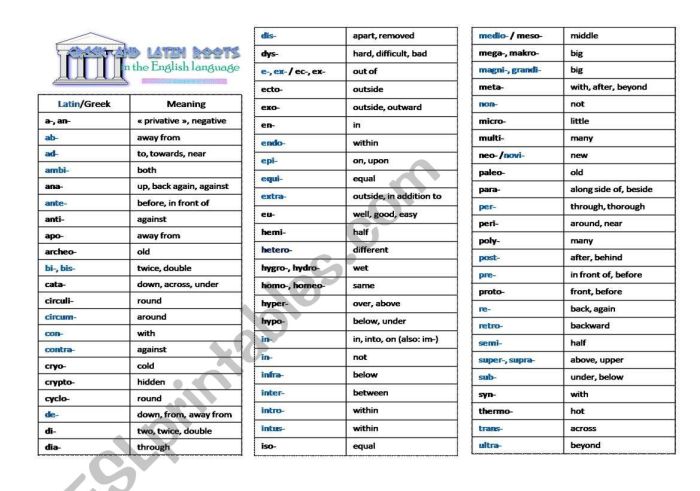Delving into the realm of vocabulary from Latin and Greek roots unit 1, this exploration unveils the profound significance of these ancient languages in shaping the English lexicon. By deciphering the etymological tapestry of words, we embark on a journey of linguistic discovery that enriches our understanding and expands our vocabulary.
Through a systematic examination of common Latin and Greek roots, their meanings, and their pervasive presence in English vocabulary, this unit unravels the strategies for identifying and utilizing these roots to enhance our word power. Furthermore, it explores the practical applications of Latin and Greek roots in diverse fields, demonstrating their enduring influence in shaping technical terminology and professional vocabulary.
Vocabulary Development from Latin and Greek Roots

Latin and Greek roots form the foundation of a significant portion of English vocabulary. Understanding these roots can greatly enhance one’s vocabulary and comprehension skills.
Benefits of Studying Latin and Greek Roots
- Expands vocabulary by providing a deeper understanding of word origins and relationships.
- Improves reading comprehension by enabling the identification of unfamiliar words based on their root meanings.
- Facilitates writing fluency by providing a comprehensive vocabulary for precise expression.
Common Latin and Greek Roots
| Root | Meaning | Examples |
|---|---|---|
| ag/act | Do, act | Action, agent, react |
| chron/chrono | Time | Chronology, chronic, synchrony |
| dict/dic | Say, speak | Dictate, diction, predict |
| graph/gram | Write | Graph, grammar, biography |
| log/logos | Word, speech | Logic, dialogue, monologue |
Identifying Latin and Greek Roots in Words, Vocabulary from latin and greek roots unit 1
To identify Latin and Greek roots in words, break them down into their component parts:
- Remove prefixes (e.g., un-, re-, dis-) and suffixes (e.g.,
- tion,
- ment,
- ity).
- Identify the base word or stem.
- Compare the stem to known Latin or Greek roots.
- Consider the context and meaning of the word to confirm the root’s meaning.
For example, the word “predict” can be broken down into “pre-” (before) and “dict” (say), indicating that it means “to say something before it happens.”
Using Latin and Greek Roots to Enhance Vocabulary
Understanding Latin and Greek roots allows learners to infer the meaning of unfamiliar words:
- Identify the root and its meaning.
- Consider prefixes and suffixes for additional context.
- Use the root meaning to guess the overall meaning of the word.
For example, the word “chronology” can be inferred to mean “the study of time” based on the root “chron/chrono” (time) and the suffix “-ology” (study).
Applications of Latin and Greek Roots in Various Fields
Latin and Greek roots are extensively used in various academic disciplines:
Medicine
- Diagnosis (dia- “through” + gnosis “knowledge”)
- Pathology (pathos “disease” + logos “word”)
Law
- Contract (con- “together” + tract “draw”)
- Prosecution (pro- “forward” + sequi “follow”)
Science
- Biology (bio- “life” + logos “word”)
- Geology (geo- “earth” + logos “word”)
FAQ Explained: Vocabulary From Latin And Greek Roots Unit 1
What is the significance of Latin and Greek roots in English vocabulary?
Latin and Greek roots form the foundation of a vast majority of English words, providing insights into their meanings and relationships.
How can studying Latin and Greek roots benefit vocabulary expansion?
Understanding Latin and Greek roots enables learners to decipher unfamiliar words, infer their meanings, and expand their vocabulary exponentially.
What are some strategies for identifying Latin and Greek roots in words?
Breaking down words into their root parts, examining prefixes and suffixes, and comparing them to known roots can aid in identifying Latin and Greek roots.
How can understanding Latin and Greek roots enhance vocabulary?
By recognizing root patterns, learners can deduce the meanings of unfamiliar words, make connections between words, and improve their overall vocabulary.
What are some applications of Latin and Greek roots in various fields?
Latin and Greek roots are extensively used in technical terminology and professional vocabulary across disciplines such as medicine, law, and science.

